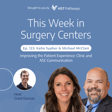
Andy Berg – Opening an ASC: Finding Your Dream Team
Andy Berg, Director of Clinical Staffing at MedHQ, joined us for the sixth installment of our De Novo series to discuss the intricacies of assembling the ideal team for a new surgery center. Regardless of whether you're opening an ASC, the episode is filled with invaluable insights on staff recruitment, flexible hiring strategies, identifying leadership qualities, and ensuring your existing team is actively engaged in the interview process.
In our news recap, we'll cover the gigification of the healthcare industry, ASCA's official comments in response to Medicare's 2024 proposed payment rule, the nurses' strike still going on at Robert Wood Johnson University Hospital, and of course, end the news segment with a positive story about a new 'nuclear' prostate cancer treatment that is improving lives.
Articles Mentioned
The Gigification of Healthcare
ASCA Submits Comments on 2024 Payment Policies (Recap)
ASCA Submits Comments on 2024 Payment Policies (Full)
‘It is time to settle the strike’: RWJUH nurse work stoppage hits 40th day
A ‘nuclear’ treatment brought hope to people with prostate cancer
Interesting in learning more about opening a new surgery center? Check out our related episodes:
• Michael McClain – Opening an ASC: Navigating Payer Contracts
• Wil Schlaff – Opening an ASC: Conducting a Comprehensive Feasibility Assessment
• Dawn Pfeiffer – Ask the Expert: Best Practices for Opening a New Surgery Center
• Beata Canby – Opening an ASC: Managing the Regulatory and Certification Process
• Gregory DeConciliis – Opening an ASC: Clinical Preparation
Brought to you by HST Pathways.



















